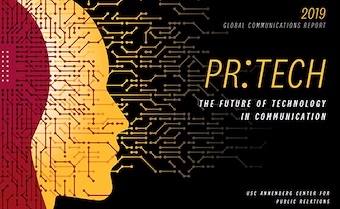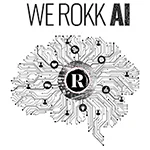Public relations professionals have mixed views regarding how technology is affecting the communications landscape and the world at large. According to the latest annual Global Communications Report conducted by the USC Annenberg Center for Public Relations, while tech is undoubtedly helping consumers become more engaged, most PR pros think it might also be contributing to an increasingly misinformed and polarized society.
The report, which analyzes emerging trends to provide insights regarding the global communications landscape, focused this year on the use of technology in the PR field. Drawing responses from both agency and in-house PR professionals as well as PR students, the USC Annenberg survey asked questions regarding the use of technology in the PR world and what relevant changes practitioners might anticipate for the future.
 Download the USC Annenberg Center for Public Relations' 2019 Global Communications Report. |
Communicators appear to agree on one thing: a vast majority (83 percent) think innovations in technology will serve as a significant driver in the industry as well as a disruptor insofar as how we communicate.
But these innovations are a double-edged sword, as PR pros also seem to agree that this disruption will arrive with a cost. On one hand, 61 percent believe that technology will cause the average consumer to become more engaged. However, the same percentage also believe this engagement will be driven by misinformation. As a result, nearly three-quarters of respondents (74 percent) believe innovations in technology will result in a society that’s even more polarized in the future than it is today.
Respondents identifying as students were slightly more optimistic, with only 43 percent predicting the average citizen would become more misinformed in the future and only 53 percent believing we’d become more polarized. Students were also slightly more inclined to believe that technology in the communications industry will beat out human capital in terms of importance over in the next five years (46 percent), while working PR professionals put their bets on human capital (47 percent).
When it comes to what tech-related skills respondents think will become most vital for practitioners’ future success, big data analytics (65 percent), video production (59 percent) and search engine optimization (59 percent) topped the list, followed by digital design (54 percent), user experience (53 percent) and predictive IA technologies (43 percent).
In terms of platform, respondents believe YouTube (48 percent), Instagram (46 percent) and Google (42 percent) will drive the most effective communications strategies within the next five years, followed by LinkedIn (35 percent), Twitter (31 percent) and Facebook (30 percent).
Currently, PR pros said the top motivators for technology use within their agency involve pressure to deliver measurable ROI (28 percent), integration of communications and marketing (25 percent) and expansion of media channels (19 percent). When asked which area they'd most like to see technological advances in, a majority of those identifying as CEOs (33 percent) cited customer experience optimization, while those identifying as in-house communicators cited measurement and audience targeting (both 22 percent).
More than half (54 percent) of the CEOs surveyed ranked their company’s use of the latest communication technology as good if not excellent, while 46 percent rated their agency’s performance as average or below.
USC Annenberg’s 2019 Global Communications Report interviewed more than 2,100 public relations experts globally between January and early February, including 1,583 PR pros, 210 CEOs and 378 students.


 Laura Anderson, who rose to VP/GM of global communications and events in a nearly 20 year stint at Intel, will take on the Americas technology chair at Burson following the completion of the BCW and H+K merger on July 1.
Laura Anderson, who rose to VP/GM of global communications and events in a nearly 20 year stint at Intel, will take on the Americas technology chair at Burson following the completion of the BCW and H+K merger on July 1. WE Communications has partnered with ROKK Solutions to form the WE ROKK AI service.
WE Communications has partnered with ROKK Solutions to form the WE ROKK AI service. In the dynamic world of modern business, effective communication is a pivotal tool for success across various industries. At Communications Strategy Group (CSG®), our expertise in embracing innovation in communication extends beyond traditional marketing strategies, paving the way for transformative industry-specific solutions.
In the dynamic world of modern business, effective communication is a pivotal tool for success across various industries. At Communications Strategy Group (CSG®), our expertise in embracing innovation in communication extends beyond traditional marketing strategies, paving the way for transformative industry-specific solutions. There are two types of tech PR professionals. Which one are you? And are C-suite executives making that decision for you?
There are two types of tech PR professionals. Which one are you? And are C-suite executives making that decision for you? While there’s an impulse to grab reporters’ attention with the newest industry-transforming tech product or service, a back-to-basics approach focused on telling the right stories to the right people is a far more successful way to ensure your technology campaign breaks through the clutter of today’s crowded tech landscape.
While there’s an impulse to grab reporters’ attention with the newest industry-transforming tech product or service, a back-to-basics approach focused on telling the right stories to the right people is a far more successful way to ensure your technology campaign breaks through the clutter of today’s crowded tech landscape.


 Have a comment? Send it to
Have a comment? Send it to 
No comments have been submitted for this story yet.